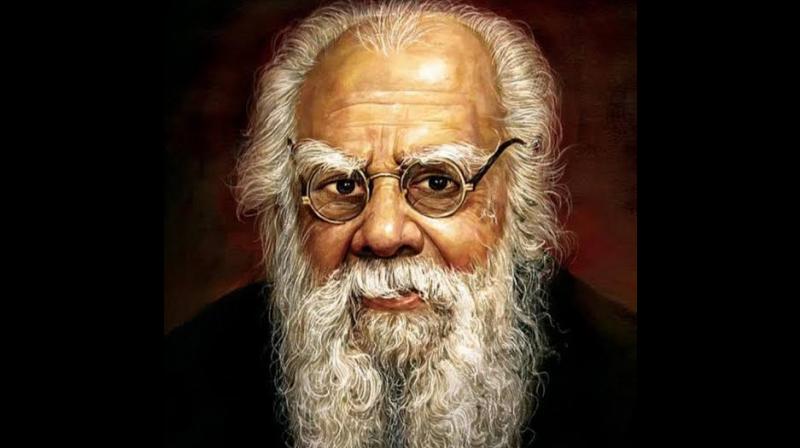Periyar, the face of caste equality and Dravidian pride, turns 141 today
Periyar was not only the face of caste reforms in India, but also a symbol of Tamil pride.

Mumbai: On Tuesday, hashtag 'HBDPERIYAR141' was among the top trending in India.
The hashtag was used to wish happy birthday to Periyar or E V Ramasamy, the pioneer of the Dravidian movement.
Periyar's philosophy and action revolved around his opposition to Brahminism and gave birth to the ideology of present day parties DMK, AIADMK and MDMK.
On his birth anniversary, we look at the legacy of an iconoclast, rationalist social reformer, a crusader of the downtrodden and father of the Dravidian movement -- Erode Venkatappa Ramasamy.
Periyar lived and worked by the principle encapsulated in his own following lines:
"There is no god, there is no god, there is no god at all.
He who invented god is a fool.
He who propagates god is a scoundrel.
He who worships god is a barbarian.''
Early years:
In 1879, E V Ramasamy was born to Venkata Naicker and Chinnathayee in Erode in the erstwhile Madras Presidency and modern-day Tamil Nadu. His parents belonged to a merchant caste – balija -- in Andhra Pradesh.
He belonged to an affluent trading family and at an early age dropped out from primary school to join his father's business. He used to listen to several religious gurus, who came to his house to teach shastras. Ramasamy, however, was critical of these teachings and started to question apparent contradictions in Hinduism.
At 19, he got married to a 13-year-old girl, Nagammai.
An incident in 1904 turned Periyar heavily against the caste system in India. In the holiest city for Hindus -- Varanasi, he was turned out of an eatery because he was not a Brahmin. He was once again stopped from entering a temple for sporting a moustache — something Brahmins rarely did back in the day.
The pilgrimage made him realise that Hinduism was nothing but Brahminical domination and exploitation.
Politics:
In 1919, the reformer joined the Congress under the influence of his close friend C Rajagopalachari (Rajaji). Later, he was appointed as the president of the Madras Presidency Congress Committee in 1922. Ramasamy, however, left as his efforts to get reservations for the lower caste in education and government jobs were defeated within his party during the Tirupur session.
Texts on his life note suggest he observed that Congress was working for Brahminical interests and hence decided to resign.
During his initial days in Congress he held various key positions in the Erode municipality. He rigorously fought for issues related to khadi, liquor prohibition and abolition of untouchability. He was jailed for participating in the non-cooperation movement.
His work for the upliftment of lower-caste Keralites in 1924-25 during the Vaikom Satyagrah gave him the moniker "Vaikom Veeran".
In Vaikom, a town of the erstwhile Travancore kingdom, lower-caste people were not allowed to even go near the temple. He fiercely led the movement which left an impression on his ideas and political life.
In 1925, Periyar dived into radical, on-ground politics with a trade union movement in Nagapatinam. It was this occasion when he happened to meet the pioneer of communist ideology -- Singaravelan. Around this time, he started the notable Self-Respect Movement -- also referred to as the Dravidian movement.
He went on to join the Justice Party and was elected president in the late 1930s. He renamed it the Dravidar Kazhagam (DK) in 1944.
Ramasamy was also against the imposition of Hindi. When C Rajagopalachari, India's last Governor-General, made Hindi compulsory in all government schools in 1937, as the chief minister of Madras Presidency, Ramasamy launched a protest against the move.
He gave the popular slogan "Tamil Nadu for Tamilians". His ideas and crucial involvement in the Justice Party changed his political identity forever. He later came to be known as Periyar meaning 'respected one' or 'elder'.
In 1950, he declared his party's vision. He wanted to build a platform to bring social and religious reform through the Dravida Kazhagam.
“The final agenda of this party is to destroy all religion,” he had said.
When Muslim League demanded Pakistan, Periyar demanded for a separate Tamil country.
In fact, when the whole nation was celebrating freedom after decades of British rule, Periyar recognised the country’s first Independence Day as a day of sorrow.
His party never entered the electoral politics. His protege, C N Annadurai, however, wanted to contest elections. The dissent forced Annadurai to leave the party and start his own Dravida Munnetra Kazhagam in 1949.
To disseminate his ideas of social justice and self-respect, Periyar also founded a newspaper -- Kudi Arasu. This became Periyarr's full-time job untill his death at the age of 97.
A radical feminist:
Periyar was a staunch believer in gender equality. He fought for the progress of women and questioned gender inequality prevalent in society. He fought against barbaric social customs which were unfair to women, such as child marriage and widow remarriage. He encouraged women to actively take part in social movements and politics.
Periyar tirelessly worked for women’s education and raised the issue of 50 per cent reservation for women in all the sectors.
At the women's conference in Chennai in 1938, he was conferred the respectable sobriquet 'Periyar'.
Periyar was not only the face of caste reforms in India, but also a symbol of Tamil pride. His political ideas continue to hold significance in contemporary politics in Tamil Nadu and inspires DMK and AIADMK.
Catch the latest news, live coverages and indepth analyses from India and World. Follow us on Facebook and Twitter.

